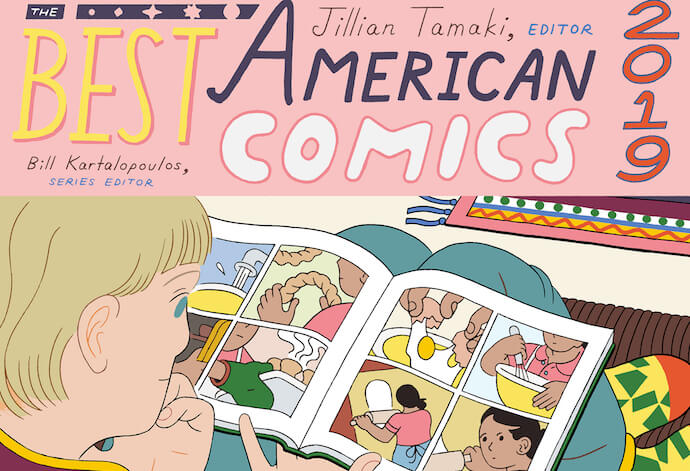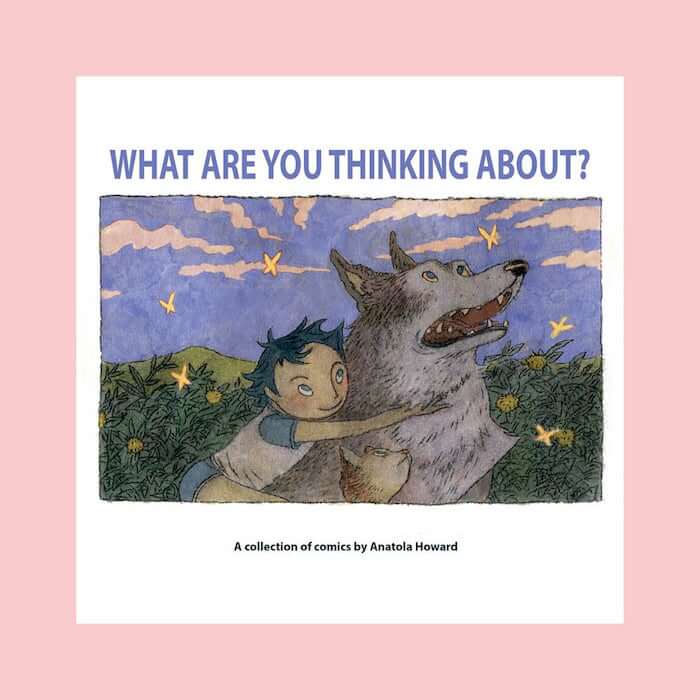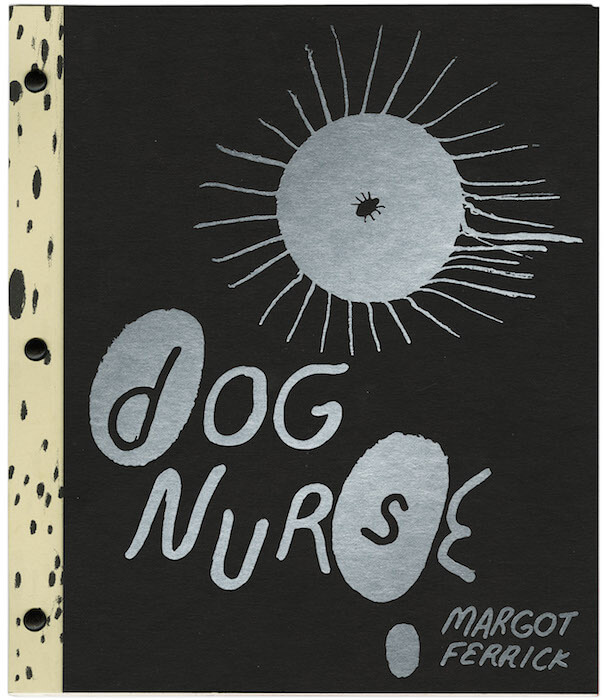Several weeks ago, I was browsing in a favorite local bookstore when Best American Comics 2019 (BAC) caught my eye. While the cover, illustrated by Sophia Foster-Dimino, has a bright, engaging image of a comics reader and comics character watching each other through a window (hello there, windows and mirrors theory!), it was the name Jillian Tamaki that drew me in. A whole book of indie comics curated by one of my favorite indie cartoonists? How had I missed this!
Best American Comics 2019
Bill Kartapoulos (series editor) and Jillian Tamaki (editor)
Houghton Mifflin Harcourt
October, 2019

When I first started reading the collection, I got a bit interested in the history of the series, but diving into the discourse surrounding it was much wilder than expected. Rather than going down a black hole of Feelings about the series, I decided to focus on BAC 2019 as a contained anthology, serving a specific purpose: to give two respected people in comics a chance to uplift notable comics from a single publishing year.
Best American Comics is one of several titles published by Houghton Mifflin Harcourt in the Best American series each year. Bill Kartapoulos serves as the series editor for the comics focused title, which requires him to select notable works out of hundreds of publications, and then hand them off to the year’s guest editor—in 2019’s case, Jillian Tamaki. In her introduction, Tamaki notes that BAC editors have a tradition of remarking on their own subjectivity, and she goes on to do the same. She cautions readers that BAC is both a pair of people’s ideas on which comics from a year of publishing are notable, and a time capsule of sorts, capturing work that comes out of a specific cultural context. The book provides excerpts from longer works, but reproduces several entire, shorter pieces.
Setting the excerpts aside for a moment, BAC includes several short comics reproduced in their entirety. A few pieces in particular stood out to me, especially as they linked back to Tamaki’s introduction. Ben Passmore’s comic, “Martin Luther King Jr. was More Radical Than You Think,” first published by The Nib, was familiar but felt perfect to reread in the aftermath of the Chicago Teacher’s Union (CTU) strike. Passmore places himself in conversation with King by drawing himself responding to the activist’s speeches and quotations. The two debate across time about the role of violence in activism. Drawing back to Tamaki’s description of BAC as a time capsule, Passmore discusses the uprising in Ferguson, and the “…uneasy relationship between professional activists and people leashing out at their oppression.”
He also expresses a great deal of respect for King, especially his assertion that protest should grind society to a halt to make people address oppression. I thought about this intensely as, toward the end of the CTU strike, frustrated parents began to vent to us at the library that they needed the strike to end so their kids could go back to school. I love the idea that people will continue to read volumes of BAC to take a look into that capsule of time, and to connect across it—just as Passmore imagines himself connecting to and debating King.
A topic I think will stand the test of time is identity. In her introduction, one of the snippets of context Tamaki provides is the current cultural conversation about, as she phrases it, “[grand gesture of hand] diversity.” She ends that paragraph with a somewhat tongue in cheek question that will stay with me a long time: “What does responsible commodification of identity look like?”
When I looked back at the introduction, this question immediately brought to mind another comic BAC presents in its entirety: “In Search of Water-Boiled Fish,” by Angie Wang, originally published in Eater. Wang draws herself as a tiny, cartoonish person walking amongst enormous bowls of soup as she embarks on a quest to find Shui Zhu Yu, water boiled fish, which she ate frequently while living in Beijing with her father. The version of Shui Zhu Yu with which Wang became familiar is different from the red stew typically found in the restaurants she scoured in the US, and while her journey was delicious, it was often unsatisfying.
The scale of the comic efficiently conjures the power that taste and memory can have in combination. As a second generation Pole who grew up largely without Polish community, my connections to culture and food are hyperspecific, and I often feel lost in the large Polish community I live amongst now. That craving for YOUR version of something was deeply relatable, and Wang’s assertion that “we’re each authorities of our own food memories,” felt like some kind of earnest answer to Tamaki’s question. How do we discuss and engage with identity while we commodify it through saleable art? With as much specificity as possible, with awkward disclaimers, with a great deal of struggle, perhaps.
The excerpted comics, unsurprisingly, sometimes served as a perfect amuse-bouche, igniting my hunger for more of an artist’s work, while failing to engage me at others. Humor was often a good lure, and as it was with “Self Love Cycle,” a snippet from What Are You Thinking About? by Anatola Howard, published by Shortbox. In a series of comic strips spanning only two pages, a man clones himself, marries himself, establishes his newest clone as their baby and starts a society. The strip ends on such a hilarious, solid burn that I cracked up and immediately wanted to seek out the full work.
I had a similar experience with “Perfect Discipline,” an excerpt from Perfect Discipline and Unbending Loyalty by Tommi Parrish, originally published by Perfectly Acceptable Press. The comic depicts a scene in which an adult child and their ailing mother have a very awkward conversation while in the worst of places—a doctor’s office’s waiting room. The mother fumbles pronouns and fails to grasp her child’s queerness and polyamory. She tries to wheedle her child into considering a more typical, heterosexual lifestyle, and describes motherhood and parenthood as “what most people are doing” at their age. The gap between the two of them is clear, but ultimately the mother reminds her child of how difficult it’s been to be sick and alone. Parrish ability to depict the layered and complicated nature of their relationship stuck with me, and when I was next in a bookstore I found myself looking for more of their work.
The excerpts that did not work for me fall roughly into two categories: first, comics that just aren’t my jam, and second, comics that are difficult or even impossible to excerpt well. Margot Ferrick’s Dognurse, also published by Perfectly Acceptable, fell into the first category for me; while the description intrigued me, the comic has a level of intensity that I wasn’t ready for, and made me not want to seek it out. That’s not a critique—it’s just me knowing that, at least at this time in my reading life, this one’s not for me.
Kindling by Xia Gordon provides an example of the second category. The comic seems to be mostly abstract line work that likely conjures emotion and story well in a whole piece, but was difficult for me to grasp in a short snippet. If I were perusing BAC more casually, Gordon’s piece would come off as forgettable.
I struggled differently with the excerpt from Connor Willumsen’s Anti-Gone, published by Koyama Press. A lot about this comic immediately pulled me in—like the character designs, which are otherworldly and unique, but contrast the dialogue and setting (a movie theater in a mall), which were incredibly familiar. Willumsen communicates a lot of intense emotion through simple dialogue as two very high people prepare to watch a highly anticipated film, but I was so thirsty for further context that reading the excerpt left me frustrated. The artist’s statements are key for such snippets, and Willumsen’s does provide a good deal of help, but the setting of the comic is so wild—“a half-submerged contemporary metropolis” is just part of the description—that I felt lost. Of course, dissatisfaction can make an excerpt successful. I will have to read the full comic to get all the context!
I can see a lot of merit in having these collections in libraries. (Did you think I wasn’t going to talk about libraries? Hah!) Several of the comics in BAC discuss difficult topics, like the danger and complicated emotional nature of sex work, sexual assault, toxic relationships, or abortion. Coming across these works in an anthology—with proper content warnings—is a way to get people to look and understand when they’d rather turn away. It’s a move that needs to be done with care, but an important one that can raise crucial voices.
Looking at the notable comics listed on Bill Kartalopoulos’ blog, I was also struck by how many names were present there or in BAC itself I don’t expect to find at the library. I hope to find more ways to get small press and self published work into the library, but BAC can do something I can’t—it can, even in small snippets, publish work through a mainstream press that nobody will argue about ordering for our collection. There’s a good number of marginalized artists represented in this volume of BAC, including trans artists, Asian artists, black artists, queer artists—you know, that [grand gesture of hand] diversity thing. It’s exciting to realize that people can pick this up at the library—and they are, I only got the book for three weeks because someone else had it on hold—and find artists they wouldn’t otherwise.
As a librarian, I can also affirm that “best of” lists and reviews matter. Librarians and booksellers can’t read everything; we rely on reviews and lists to decide what to purchase for our spaces. The comics that we uplift through our criticism will get purchased, distributed, and reach readers more.
I enjoyed BAC 2019, and can see it fitting into both my work as a librarian and my personal, insatiable interest in indie comics. We’re lucky to be flooded with good webcomics, zines available at festivals, specialty shops and online, and books from an ever growing number of fantastic small presses, but this explosion of publications makes it easy to miss good work. BAC made me feel spoiled, like Jillian Tamaki did a bunch of work just for me! It’s a nice feeling. If you’d like to experience that feeling yourself, pick up a copy, perhaps from your local library.



